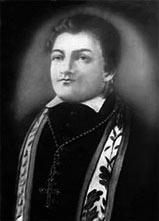
Relations with the Oblates
Father Power, as vicar general of Montreal, accompanied Bishop Bourget to Europe in 1841, and met Bishop de Mazenod in Marseilles on that occasion. On the occasion of his second visit to Europe, in June 1847, he stopped again in Marseilles. Father Jean-Baptiste Honorat was present at his Episcopal ordination on May 8, 1842. At that time, the new bishop asked the Oblate superior to send an Oblate who would learn English and who would take charge of the Indian missions (letter of Honorat to de Mazenod, July 11, 1842). On July 16, Bishop Power wrote to Bishop Bourget saying that “he would need two or four good missionaries who were able to travel throughout the countryside to help the priests already established in those areas and to evangelize those who had not the good fortune to have a minister of religion in their midst”. He would like to have Father Adrien Telmon at once because, he said: “being familiar with the singing, the ceremonies and the rites of the Church he could be of inestimable help while learning English at the same time.”
In his letters to Bishop de Mazenod during the summer of 1842, Father Honorat mentioned a plan to send one or two Oblates to Toronto because” he said “there is a bishop there who knows us and likes us.” He suggests sending Father Leonard Baveux who would take care of the Iroquois , or Father Telmon with Brother Louis Roux. The Founder did not hasten to reply and did not seem to be in favour of sending priests to this new diocese: “As for Toronto, what is being offered to you?” he wrote to Father Honorat on January 17, 1843. “Are there missions in that area? If you would be reduced to being pastors, to being isolated and fixed in the same place, you are aware that it is not for us.” Father Telmon replied to Bishop de Mazenod on March 11, quoting an extract from a letter by Bishop Power to Father Honorat: “I am convinced that two or three good and zealous missionaries who would travel throughout the diocese, while preaching, exhorting and explaining the Catholic doctrine, would do an immense good and would draw to the Church an immense crowd of Christians who unfortunately have no means of enlightenment, but we will have to wait and be patient … I do not flatter myself but I pray to God that your establishment in Ireland may be a nursery for good and zealous priests who will come to bring to these faraway places the same benefits that their brothers have brought to Lower Canada. There is only one miracle that I hope for in our time, that of seeing all the French missionaries speaking English, etc.”
Bishop Power does not seem to have renewed his request afterwards, because, in September 1843 the Jesuits, who had been expected for two years, accepted to go to the diocese of Toronto and to return to take possession of their old mission on the northern shore of the Great Lakes.
In a letter to the Pope on September 24, 1846, Bishop Power gave his support to the request of the bishops of Canada that Bytown be erected as a diocese and that Father Guigues be appointed bishop. The preceding September 8, he had suggested to Bishop Bourget that part of the diocese of Toronto be included in the diocese of Bytown. In his letter to the Congregation of Propaganda on April 12, 1847, he insisted that, in keeping with the laws of the Church, the future bishop “should be able to understand and speak to his people: it is therefore an urgent matter that the new bishop and almost all his clergy get down immediately to study the matter; at present there are only a few priests who know this language while at this moment a knowledge of it is absolutely necessary; more than half of the new diocese is made up of persons of British origin”. Father Guigues was appointed bishop of Bytown on July 9, 1847 and we know that he went immediately to Saint-Colomban to learn English before his Episcopal ordination on July 30, 1848.
Yvon Beaudoin, o.m.i.
